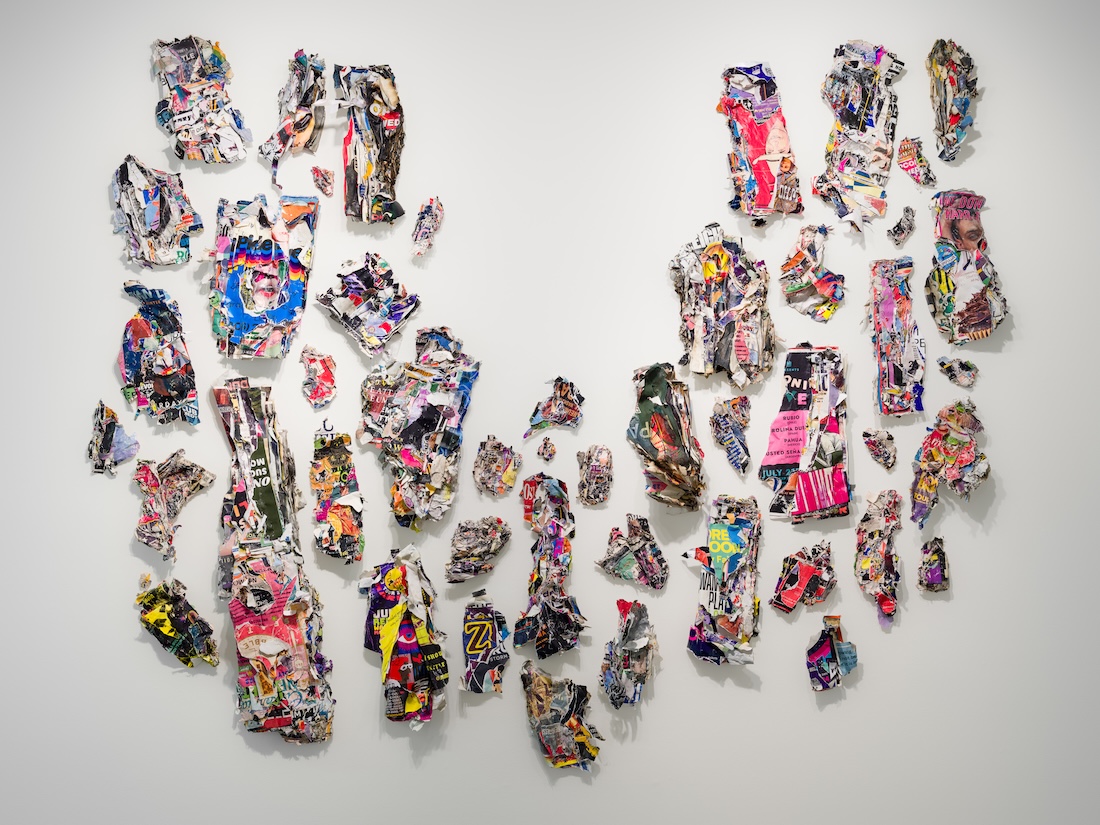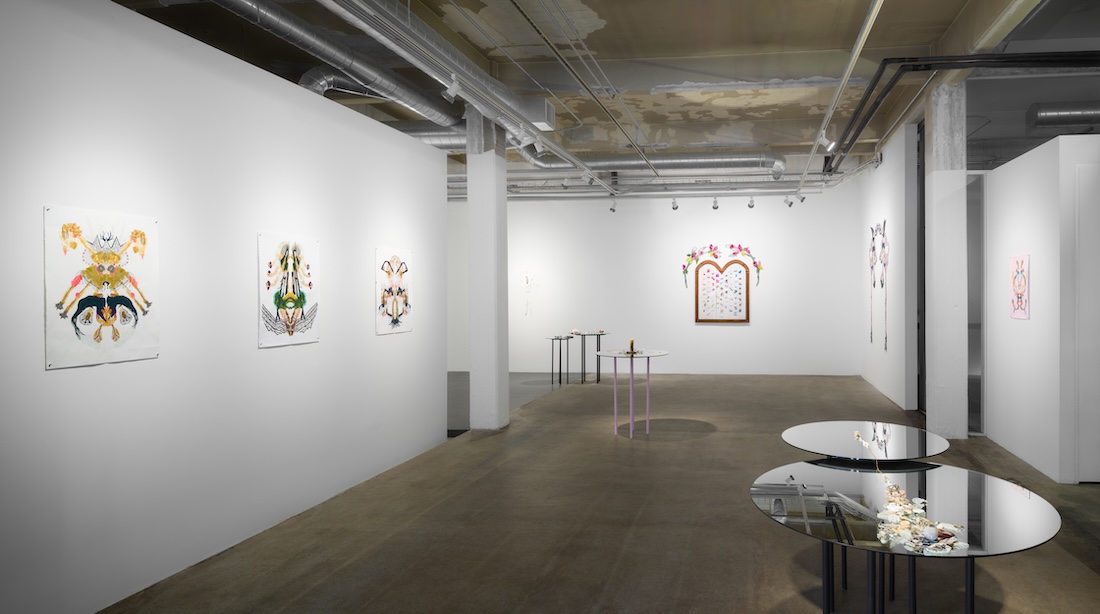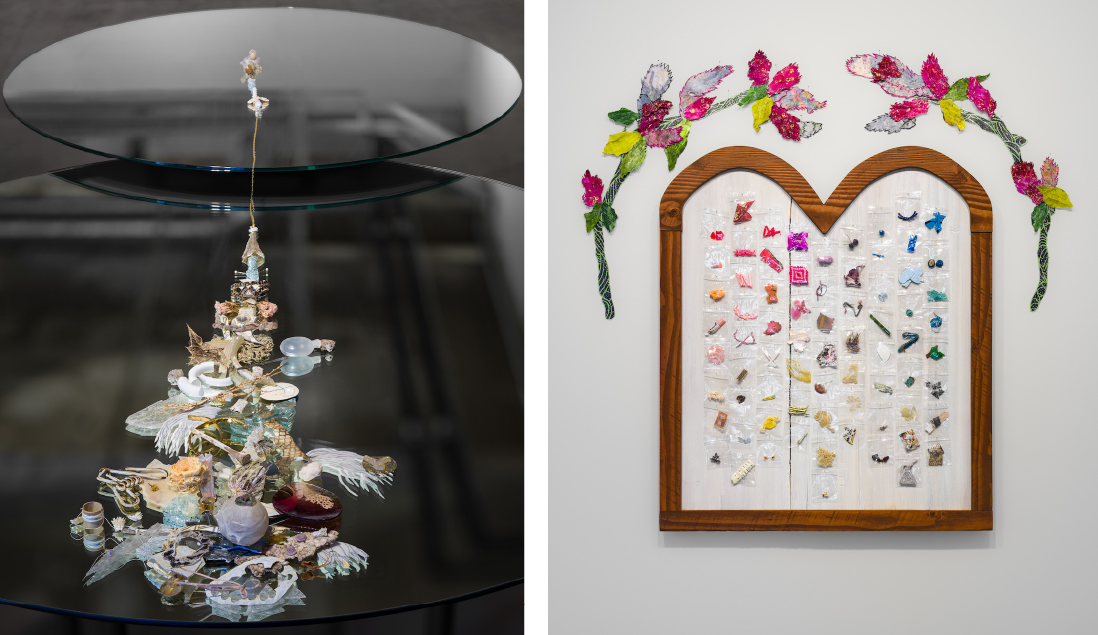Seeking Balance: Diana Dvora Falchuk honors divine interconnections in Reshimu

Diana Dvora Falchuk has been preserving a lone butterfly wing since she received it as a gift from a friend in 2007. It’s one of countless little objects she’s amassed over many years, from a piece of gum she chewed in her early 20s to a plastic glow-in-the-dark dinosaur that her son used to play with.
“There’s always been the story of where the objects came from, who else engaged with them, and where in the world they have lived before in my house or my studio,” she says. “I feel almost like a parental motherly responsibility for them.”
A number of Falchuk’s carefully stewarded objects are currently on view as part of her Gallery 4Culture exhibition, Reshimu. Arranged, altered, and combined in various ways, some of them form a series of sculptures on mirrored glass while others appear in a larger wall installation titled “Casa Falchuk – Hay de Todo” that pays homage to her ancestors, who also collected a little bit of…everything.

Prior to World War I, her paternal grandfather and their family were living in what is now Belarus. At different points leading up to and after the war, some family members were murdered in anti-Jewish pogroms and others escaped as refugees. Her grandfather, still a child, reunited with his next eldest brother in Cuba following the war. Together they moved to Venezuela in search of economic opportunity, and upon their arrival they had to “find a way to survive within a Catholic society, not for strictly religious reasons— they weren’t very religious actually—but because Jews were treated differently,” Falchuk explains. “They had these mercantiles where they literally sold whatever was needed to be sold. It was like, you need something? Come to Casa Falchuk.”
The brothers had started off selling their wares on the beach in Cuba. Once in Venezuela, they went from house to house, then set up a street cart before eventually opening their storefront. At one point, Falchuk says, they made ends meet by going “door to door offering to paint Catholic Venezuelans as saints.” (Her father and some of his cousins eventually ended up in the U.S., where Falchuk was born.)
As an exhibition, Reshimu—a Hebrew word used in Jewish mystical tradition to describe the trace of divine light in all things—is deeply rooted in Falchuk’s Jewish heritage and spirituality.
It grew out of a search for balance. Starting in 2018, she began practicing different ways to integrate the many facets of her personal life, her artist life, and her life as an organizer, coach, facilitator, and policymaker focused on fighting racism and antisemitism. “I was just kind of questioning myself, like, how can I stay more steady and be more authentic, more reliable, more consistent?” During this time she started learning the Jewish spiritual ethical practice of Mussar to cultivate interconnection and balance.

“The spiritual, material, and political are inextricably and inherently bound,” Falchuk says. “That’s actually a beautiful, wonderful thing because it can support us more in fully manifesting the divine in our daily life. Thinking about all the different peoples who are struggling together for liberation, we all have our different lineages for understanding interconnection—the ways that we go about trying to make change and trying to heal ourselves and each other.”
Falchuk says orienting herself to the health and wellbeing of all living beings has been instrumental not only in her art practice, but also in her work dismantling antisemitism—including the ways it gets claimed to shut down protests supporting Palestinians, undermine democratic norms, and promote a white Christian nationalist agenda.
Fueled by a desire to bring disparate fragments together, she began experimenting with symmetry in her drawing and painting. Working freehand without a center line, she would try to make two sides of a 2-D image match each other, knowing they would never be perfectly exact. That exploration led her to try making monotypes by folding sheets of paper in half repeatedly and seeing how the paint looked different on each side. These efforts led to the multimedia monotypes in Reshimu.
The exhibition also features “Palimpsest,” a wall installation made from hunks of posters Falchuk removed from utility poles in Seattle’s Capitol Hill neighborhood. “All the layers of all of people’s offerings and invitations and needs—a lost cat or a service for therapy or an art show or music,” she says. “There’s just so much of life that is being offered, and that’s also for the taking.” She’s also been working with utility poles and their detritus for over 25 years, drawn to their histories and textures like she is to her collection of objects.
In another large work, “If We’re the Devil, Then the Devil is Surely Gorgeous,” Falchuk again makes use of posters—but in a different way. She initially set out to make a large-scale tallit, a Jewish prayer shawl, for her future ancestors. But after working with various materials, she ultimately settled on referencing the tallit using her own poster designs, similar to the ones she makes as an activist, ripping them up, dipping them in wax, and building them up in layers.
Like the entire exhibition, the piece is Falchuk’s way of trying to find healing and repair—which is the whole idea behind Tikkun Olam, a central principle of Judaism that calls for repairing the world in whatever ways you can.
Reshimu is on view through March 27.
